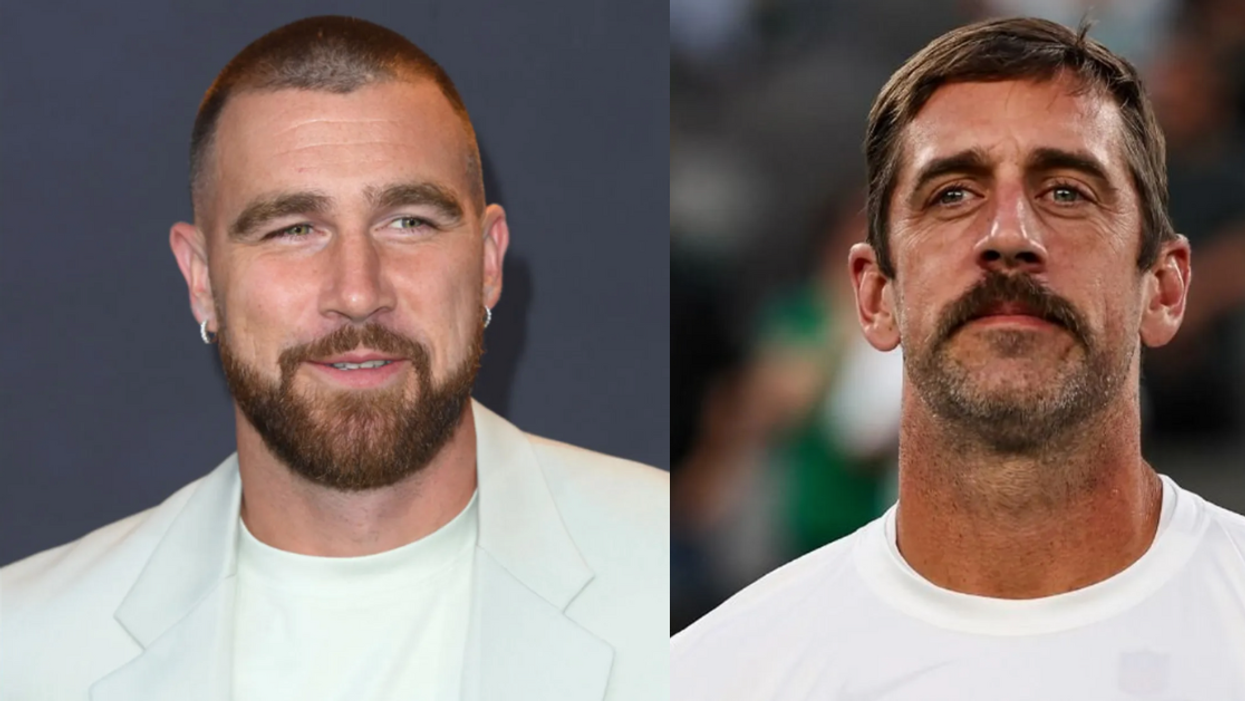Kansas City Chiefs player Travis Kelce gave a classy response about his reasons for taking the COVID-19 vaccine after getting ribbed by outspoken anti-vaxxer Aaron Rodgers, who is currently recovering after sustaining an injury during his debut playing with the New York Jets.
Rodgers referred to Kelce as "Mr. Pfizer" while discussing the Green Bay Packers' game against the Chiefs during an appearance on The Pat McAfee Show. Rodgers' comment came shortly after Kelce starred in a commercial promoting flu and COVID shots in partnership with Pfizer-BioNTech, the pharmaceutical company known for its COVID vaccine.
At the time, Rodgers spoke about Kelce by claiming the Jets had "kinda shut him down a little bit." Rodgers said Kelce "didn’t have his crazy impact game, obviously, he didn’t have his yards and stuff.”
Kelce responded to Rodgers' remark with humor after being asked about it by reporters.
You can hear what Kelce said in the video below.
Kelce noted:
"I thought [Rodgers' remark] was pretty good. With this mustache right now I look like a guy named Mr. Pfizer. Who knew I'd get into the vax wars with Aaron Rodgers, man?"
"Mr. Pfizer vs. the Johnson and Johnson family over there."
When asked why he'd appeared in the commercial, Kelce gave a succinct response:
"I got it because of keeping myself safe, keeping my family safe, the people in this building, so yeah I stand by it 1000%. Fully comfortable with him calling me Mr. Pfizer."
Many praised Kelce's response.
Rodgers has a history of discussing COVID-related topics, including his own vaccination status. In 2021, he faced controversy for potentially misleading the public about his vaccination status and was critical of the NFL's pandemic restrictions.
He was criticized by such individuals as Fox sports analyst and retired Steelers quarterback Terry Bradshaw, who said it "would've been nice" if Rodgers "had just come to the naval academy and learned how to be honest."
State Farm Insurance also faced significant criticism after it published a statement of support for Rodgers referring to him as "a great ambassador." The move angered many who said the company's statement was irresponsible given the United States' lagging COVID-19 vaccination response.








 The Benny Show
The Benny Show





 @neilforreal/Bluesky
@neilforreal/Bluesky @savannahcat/Bluesky
@savannahcat/Bluesky @qadishtujessica.inanna.app
@qadishtujessica.inanna.app @v-ron/Bluesky
@v-ron/Bluesky @nelnelnellie/Bluesky
@nelnelnellie/Bluesky @beatlenumber9/Bluesky
@beatlenumber9/Bluesky @pinkzombierose/Bluesky
@pinkzombierose/Bluesky
 @theunobsolete/TikTok
@theunobsolete/TikTok @theunobsolete/TikTok
@theunobsolete/TikTok @theunobsolete/TikTok
@theunobsolete/TikTok @theunobsolete/TikTok
@theunobsolete/TikTok @theunobsolete/TikTok
@theunobsolete/TikTok @theunobsolete/TikTok
@theunobsolete/TikTok @theunobsolete/TikTok
@theunobsolete/TikTok @theunobsolete/TikTok
@theunobsolete/TikTok @theunobsolete/TikTok
@theunobsolete/TikTok @theunobsolete/TikTok
@theunobsolete/TikTok @theunobsolete/TikTok
@theunobsolete/TikTok @theunobsolete/TikTok
@theunobsolete/TikTok @theunobsolete/TikTok
@theunobsolete/TikTok @theunobsolete/TikTok
@theunobsolete/TikTok @theunobsolete/TikTok
@theunobsolete/TikTok @theunobsolete/TikTok
@theunobsolete/TikTok @theunobsolete/TikTok
@theunobsolete/TikTok
 @laysuperstar/TikTok
@laysuperstar/TikTok @laysuperstar/TikTok
@laysuperstar/TikTok @laysuperstar/TikTok
@laysuperstar/TikTok @laysuperstar/TikTok
@laysuperstar/TikTok @laysuperstar/TikTok
@laysuperstar/TikTok @laysuperstar/TikTok
@laysuperstar/TikTok @laysuperstar/TikTok
@laysuperstar/TikTok @laysuperstar/TikTok
@laysuperstar/TikTok @laysuperstar/TikTok
@laysuperstar/TikTok @laysuperstar/TikTok
@laysuperstar/TikTok @laysuperstar/TikTok
@laysuperstar/TikTok @laysuperstar/TikTok
@laysuperstar/TikTok @laysuperstar/TikTok
@laysuperstar/TikTok @laysuperstar/TikTok
@laysuperstar/TikTok @laysuperstar/TikTok
@laysuperstar/TikTok